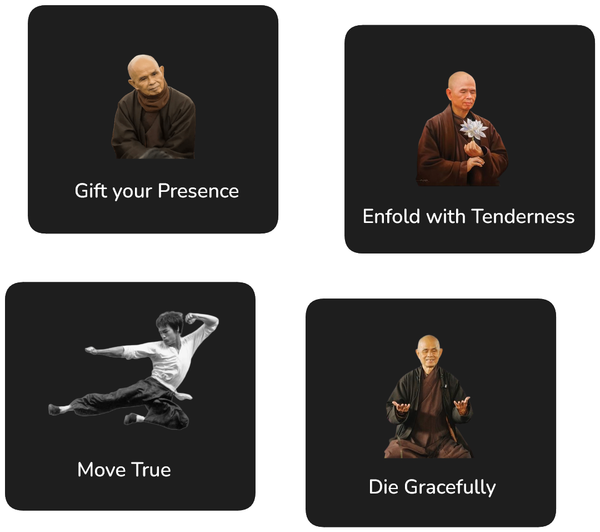Identity, Habits and Enlightenment

I recently read the book Atomic Habits by James Clear. One of the interesting ideas presented in this book was that in order to bring about personal change, we need to start with our identity, then change our practices and processes and thus achieve better outcomes; as in, I am a health conscious person, therefore I will change my habit of eating fast food for lunch and thus eat healthy food for lunch. This is presented as being in contrast to our usual way of trying to facilitate change, which would be to start with outcomes; as in, I will eat healthy food for lunch, thus changing my habit of eating fast food and ultimately become a healthy person.
I thought this is a rather useful way to think about facilitating change, even though we need to take into account that it will usually be a two way process; what I do makes me what I am, but also what I am makes me do what I do. I am also still reading the book Happiness by Matthieu Ricard and today I came across a passage in there which I think brings an additional perspective on this.
Specifically Ricard discusses the Buddhist desire to become self-less. This is grounded in the belief that having a strong sense of self makes us liable to suffer. For instance, if I see myself as a formidable athlete and I get a permanent injury, it might bring me great unhappiness. Likewise, if I attach great importance to my self and my well-being, I am prone to develop thoughts that I am disadvantaged or easily become angry when thinking I have been wronged.
This line of thinking made me consider if building habits around a strong sense of identity might be as dangerous a path to follow as building habits around a desire to achieve a specific outcome. For instance, if I am developing a new habit because I want to loose weight, I might be disappointed when I do not succeed. However if I am developing the identity of myself as a slim person, it might bring me even greater unhappiness if I am not able to accomplish this. I think this very unhappiness might be the driver which makes using an identity based approach more likely to succeed; but it likewise makes it more dangerous for our general well-being.
I think it is quite important to develop an identity and have a life purpose. These should, however, be very carefully chosen. In choosing an identity, we should choose something which is helping us towards a path of greater happiness and enlightenment, rather than something which helps us achieve a lesser goal. Also our identity and purpose should not be dependent on external factors but only on things completely under our control. In the book Eternal Dharma, some possible life goals were discussed which I think were quite interesting. They centred around bringing love and kindness into the world. Here some further examples of identities/purposes which might be safe to adapt:
- To provide the most benefit to the world given my abilities
- To find inner peace and enlightenment
- To be kind in every action
Having a strong identity is critical in finding success and happiness. However, as said, we must also keep in mind that an identity can do as much harm as it can do good. If I believe I am a person who loves shopping or going out above all, I am unlikely to bring much good into the world or for myself. But if I believe that I am kind and hard-working, I can be of great benefit to others and myself.





